Organised by Science Business
8 – 9 February 2022
Online
Website: https://bit.ly/3t1DtYO
Cluster 5 – Climate, Energy & Mobility Info Day
3 February 2022
Online
Website: https://bit.ly/3zKsq7N
Critical raw materials: an essential building block for the future of Europe
31 January 2022
Online
Website: https://bit.ly/3Gnxtxd
EU Missions Info Days
18 – 19 January 2022
Online
Website: https://bit.ly/3HxZgvc
2ⁿᵈ European Sample Preparation e-Conference
14 – 16 March 2022
Online
Website: https://bit.ly/3FUMPt7
1ˢᵗ Green and Sustainable Analytical Chemistry e-Conference
14 – 16 March 2022
Online
Website: https://bit.ly/32XQSpN
XIV Meeting of Young Chemical Engineers
24 – 25 February 2022
Zagreb, Croatia
Website: https://bit.ly/3DCdHw1
European Food Safety Authority (EFSA) public consultations
A number of consultations put forward by the European Food Safety Authority (EFSA) are currently open.
- Assessment Report on the active substance Fat distillation residues
Deadline: 5 February 2022 - Re-evaluation of the risks to public health related to the presence of bisphenol A (BPA) in foodstuffs
Deadline: 8 February 2022
You can take a look at it all here.
EuChemS is an official accredited stakeholder of the European Food Safety Authority (EFSA).
European Chemicals Agency (ECHA) public consultations
A number of consultations put forward by the European Chemicals Agency (ECHA) are currently open.
- Harmonised classification and labelling consultations
Deadlines: 21 January 2022, 28 January 2022, and 11 February 2022 - Testing Proposals
Deadline: 4 February 2022
You can take a look at them here.
EuChemS is an official accredited stakeholder of the European Chemicals Agency (ECHA).
European Commission Public Consultations and Roadmaps
A number of consultations and roadmaps put forward by the European Commission are currently open:
- Chemicals – simplification and digitalisation of labelling requirements (public consultation)
Deadline: 16 February 2022 - Climate change – new rules to prevent methane leakage in the energy sector (Commission adoption)
Deadline: 2 March 2022 - Food labelling – revision of rules on information provided to consumers (public consultation)
Deadline: 7 March 2020 - Reducing carbon emissions review of emission standards for heavy duty vehicles (public consultation)
Deadline: 14 March 2022
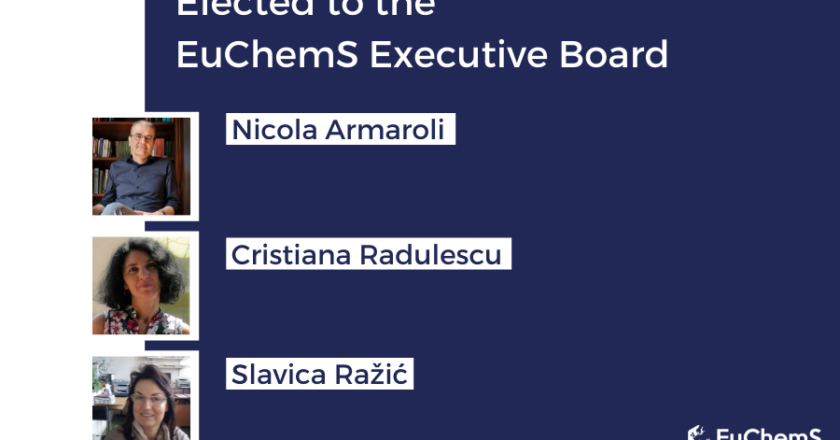
Welcome on board! – 2022 renewed EuChemS Executive Board
In 2022, Nicola Armaroli, Cristiana Radulescu and Slavica Ražić started their mandate as elected members of the EuChemS Executive Board, following elections during the 2021 EuChemS General Assembly, held online on 21 October 2021.
EuChemS continues to look forward to the many upcoming activities contributing to the progression of the chemical sciences in Europe kicked off by the renewed Executive Board. We reiterate our thanks to the former Executive Board members whose mandates ended on 31 December 2021, namely Kenneth Ruud and Livia Simon Sarkadi.
Discover more about the role of the EuChemS Executive Board and its members here.
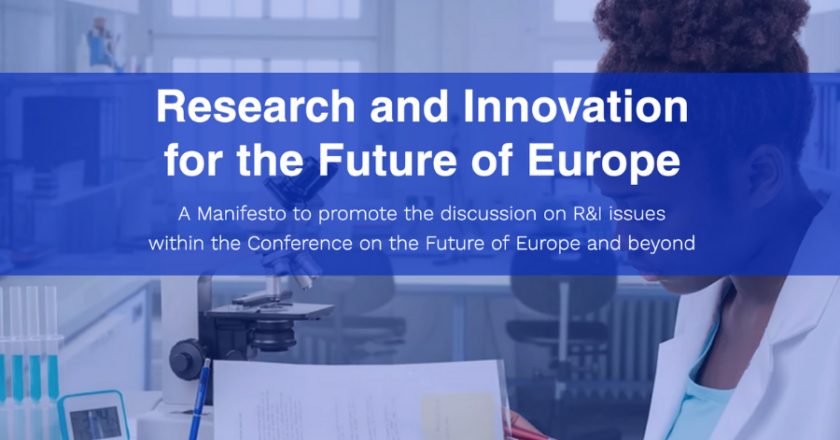
EuChemS signatory of the manifesto on ‘R&I for the Future of Europe’
The European Chemical Society (EuChemS) signed the Manifesto on ‘Research and Innovation for the Future of Europe’, supporting the goals and objectives of this initiative by promoting research and innovation within the Conference on the Future of Europe (CoFoE), and beyond.
This manifesto, released in November 2021, intends to call on the CoFoE to discuss and deepen research and innovation issues over the months to come, to place R&I at the core of the debate on the EU’s future challenges and priorities.
As a reminder, the CoFoE was launched in spring 2021 and is expected to reach its conclusions in the first half of 2022.

EuChemS @ #GWB 2022
On the occasion of the Global Women’s Breakfast 2022 #GWB2022, an IUPAC initiative, the European Chemical Society (EuChemS) is pleased to invite you to join its own online breakfast on Wednesday 16 February 2021, from 10:00 to 11:30 CET.
Our distinguished speakers, Professor Dr. Lutgarde Buydens, Professor Lesley Yellowlees, and Dr. Jovana V. Milić, will address the necessity to have women in senior positions in STEM. The webinar will be chaired by Pilar Goya, EuChemS Vice-President and Chair of the EuChemS Task Group on Inclusion and Diversity – initiator of this breakfast.
You are invited to send questions for the speakers and share your ideas on this topic in advance of the event. Get in touch with us!
We kindly invite you to register for the event ➡️ HERE
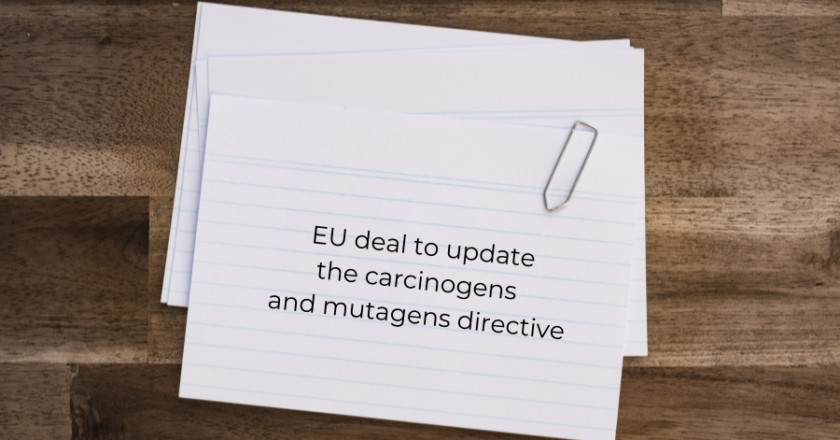
EU deal to protect workers from cancer-causing chemical substances
In December 2021, the Slovenian presidency of the EU Council and the European Parliament reached a provisional deal to update the carcinogens and mutagens directive. This EU law aims to protect workers from exposure risks to carcinogenic and mutagenic substances.
This provisional agreement is part of the European Commission’s commitment to fighting cancer under Europe’s Beating Cancer Plan and follows up the Commission’s proposal to limit workers’ exposure to cancer-causing chemicals, launched in September 2020. According to the Commission’s Press Release, ‘about 120,000 work-related cancer cases occur as a result of exposure to carcinogens at work in the EU’ every year.
Protecting workers is our priority.
Congratulations to @EU2021SI and @EPSocialAffairs for reaching a deal on the Carcinogens and Mutagens Directive (CMD4).
This is an important step towards a higher protection of around 1 million workers from dangerous chemical substances.
— Nicolas SCHMIT (@NicolasSchmitEU) December 16, 2021
Exposure limits for acrylonitrile and nickel compounds will be set and the limits for benzene exposure will be lowered. Under this agreement, reprotoxic substances will be covered by the carcinogens and mutagens directive.
The next steps relate to the examination and endorsement of the proposal by the Council’s Permanent Representatives Committee. Voting in the Council and the European Parliament would follow at a later stage.
Read the Press Release.

Report of the EFSA Stakeholder Forum 2021 now available
The report of the European Food Safety Authority (EFSA) 2021 annual Stakeholder Forum, held online on 9 and 10 November 2021, has been released. Representatives of the registered stakeholder organisations, EFSA’s Management and Senior Board, EFSA’s Senior Management, scientific and communication officers, observers from sister Agencies and the European Commission gathered to discuss EFSA’s structure, including the renewed Stakeholder Engagement Approach, food safety ecosystems and the stakeholders’ role.
Some of the outcomes of the Forum are the following:
- updated Stakeholder Engagement Approach (SEA) focusing on efficient topic-based collaboration;
- launch of a new digital platform to facilitate stakeholder engagement;
- elaboration of strategic developments within and around EFSA;
You can read the complete report here.
As a reminder, EuChemS is an official accredited stakeholder of the European Food Safety Authority (EFSA).
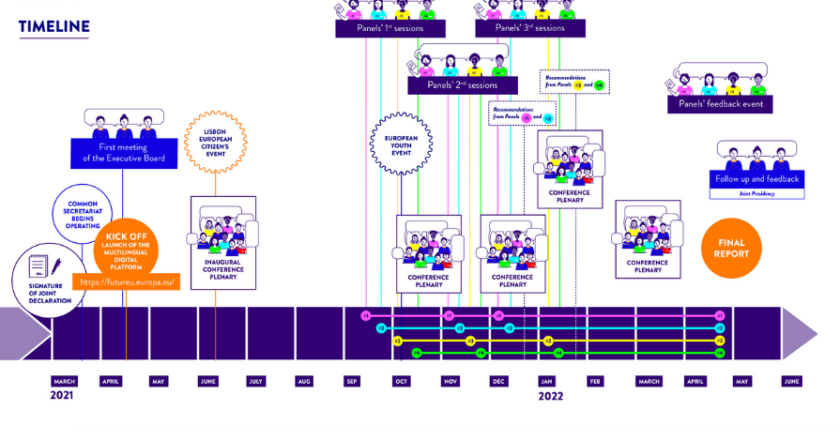
The Conference on the Future of Europe panels make recommendations on climate, environment, and health issues
On 7 and 9 January 2022, the European Citizens’ Panel on Climate Change, Environment and Health met for one last time during hybrid meetings – online and in Warsaw, Poland. This European Citizens’ Panel is a citizen-led process of the Conference on the Future of Europe (CoFoE). During these events, about 200 citizens from all EU countries gathered to address challenges related to climate, the environment, and health in Europe. They adopted 51 recommendations, to be taken forward during the Conference Plenary, scheduled at the end of January, during which the CoFoE final proposals will continue to be shaped.
The recommendations cover many topics such as the fields of biodiversity and food safety by including recommendations such as investing more research into green and sustainable solutions, finding natural alternatives to pesticides, and requiring declarations on the use of hormonal substances and endocrine disruptors in food production.
Concerning research and innovation in Europe, the citizens’ panel is requesting the following:
- further developing and synchronising already existing health R&I programmes and making academic outcomes and results freely available in all member states;
- increasing the EU budget dedicated for joint research and innovation projects around health;
- Encouraging research and development, with funding schemes, to introduce more sustainable and affordable products within the EU market.
You can read the full list of recommendations here.
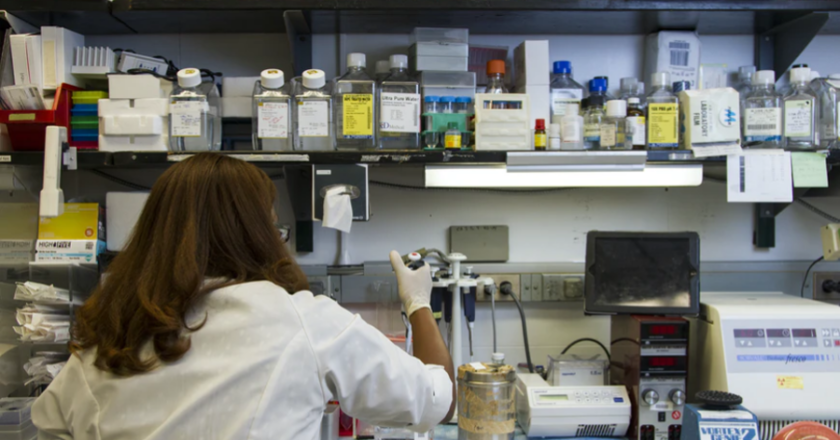
ERC delivers its first Horizon Europe Starting Grants
Under the Horizon Europe Programme, the European Research Council (ERC) has awarded 397 Starting Grants to early-career researchers around Europe. An average of €1.5 million will be granted to each young researcher to launch their projects, raising the total investment to €619 million.
The selected proposals, covering all areas of research, were allocated in three major panels: Physical Sciences and Engineering, Life Sciences and Social Sciences and Humanities. The candidates will carry out their projects at European universities, associated universities and research centres, mostly in Germany (72 projects), France (53), the UK (46) and the Netherlands (44). Switzerland is considered a non-associated third country, but as the negotiations between the EU and Switzerland were not closed before the closing of this call, the proposals from Swiss host institutions selected for funding will remain eligible if the host institution is replaced with an alternative institution form an eligible country by the time of signing the grant agreement. Mariya Gabriel, European Commissioner for Innovation, Research, Culture, Education and Youth, stated that this was a big opportunity for researchers who had left the European Union to research overseas, to come back to do science in Europe, making sure Europe remains a worldwide scientific powerhouse.
Chemistry projects fall within the Physical Sciences and Engineering panel, including different topics, from Physical and Analytical Chemical Sciences to Synthetic Chemistry and Materials or Products and Processes Engineering, among others. One of the outstanding selected projects includes the research project from Dr Sarah Guerin, focusing on the development of biomolecular crystals as a new type of organic, low-cost, high-performance piezoelectric sensors leading to the phasing-out of inorganic device components – with dramatically reduced environmental impact.
The full list of available projects is available here.
More information on the grants can be found here.
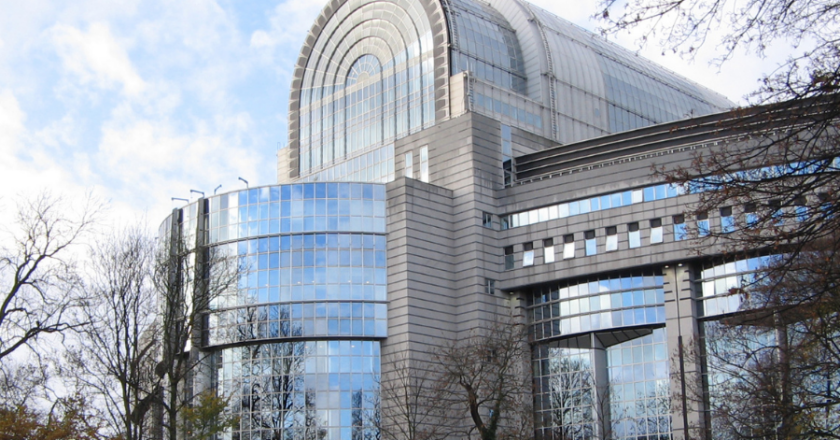
The 2022 European Parliament’s agenda for R&I and the environment
One of the important topics on the European Parliament’s 2022 agenda will be to debate and vote on legislative files to achieve carbon neutrality by 2050, as part of the Fit for 55 package legislative train schedule under the European Green Deal. Discussions will revolve around emissions targets, renewable energy, and sustainable fuels. Furthermore, as a follow up to the European Commission’s proposal to modernise EU legislation on batteries, the Parliament will also work on regulations for batteries’ sustainable production, as well as waste management of all batteries placed on the EU market.
The Conference on the Future of Europe has entered its final and decisive phase: the panels’ recommendations will be published into the final Conference report in the first semester of 2022, which will be prepared by the executive board of the Conference (i.e. representatives of the European Parliament, the Council and the Commission, as well as observers from all Conference stakeholders).
As 2022 has been declared the ‘Year of European Youth’, the Parliament is expected to actively shape and take part in the many activities scheduled throughout the year.
Did you know that you can watch meetings of various Committees of the European Parliament live? The next Committee on Industry, Research and Energy (ITRE) and the Committee on the Environment, Public Health and Food Safety (ENVI) meetings will take place on Wednesday 26 January and Thursday 27 January 2022. For details, please click on the above links.
We will keep you informed about the 2022 European Parliament activities related to R&I and climate issues in our Brussels News Updates (BNU) newsletter, starting in the February BNU with the election of the President and Vice-Presidents. Consider subscribing to stay updated!
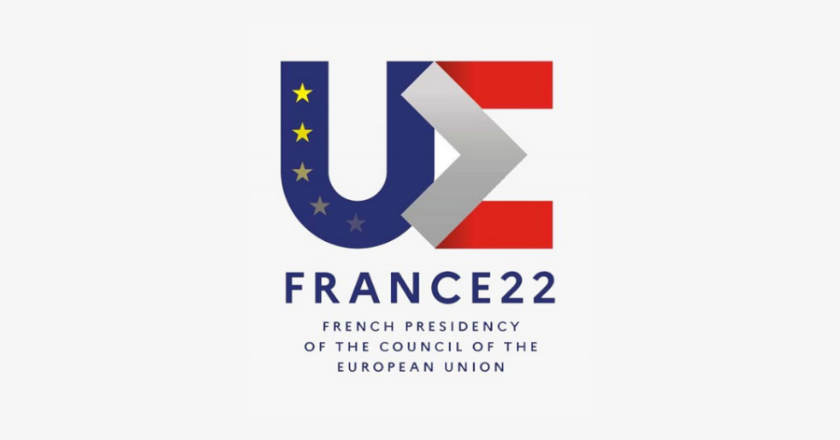
French Presidency of the Council of the EU: Recovery, Strength, and a Sense of Belonging
On 1 January 2022, France took over the Presidency of the Council of the European Union from Slovenia, thus starting a new trio Presidency composed of France, Czech Republic, and Sweden. By choosing the motto ‘Recovery, Strength and a Sense of Belonging’, France conveys its hope to unite EU citizens and to strengthen Europe’s global response to current challenges.
The French Presidency has identified three strategic priorities to guide its six-month programme for higher education, research, and innovation:
- to stimulate cooperation between higher education, research, innovation, and services to society by promoting an EU knowledge policy;
- to shape the international dimension of European higher education, research, and innovation policies, to offer appealing academic career opportunities in the EU and to set up major European university campuses;
- to nurture a sense of belonging in Europe.
If there is one key word that could define the French 6-month strategy for R&I, it would be ‘cooperation’. France takes a broad view by aiming to increase and improve scientific cooperation not only within the EU, but also internationally. As a reaction to some significant 2021 drawbacks for EU’s openness to science cooperation – Switzerland was denied access to Horizon Europe and the UK’s participation as an associated country is yet to be announced – France expressed its ambition to promote balanced R&I cooperation with non-EU countries. One of the main events of the Presidency will be the ‘Conference on International Cooperation for a Global Europe in the Field of Research, Higher Education and Innovation’ in Marseille on 8 and 9 March 2022.
In addition, France presented an ambitious model for economic growth, based on technology sovereignty. In its Presidency programme, they announced backing the building of a European Innovation Area. As a concrete steps towards establishing Europe’s technological sovereignty, the Presidency will organise a conference on ‘Europe as a leader in breakthrough innovation’ on 11 May 2022. The implementation of various European and national instruments at the regional and territorial level will also be addressed during this conference.
Horizon Europe remains a high priority on France’s agenda as the Presidency will ensure the success of its missions by coordinating them at European, national, and local levels. A ‘High-level Conference on Civic Engagement in EU Missions’ will be organised on 21 March 2022 to discuss solutions to current global challenges via the EU Missions of the Horizon Europe programme. In addition, the French Presidency has set as an objective the launch of private-public partnerships under Horizon Europe to take effect during the first six months of 2022.
As a supporter of nuclear power energy, France will extend ongoing initiatives to maintain and develop skills in the field, especially through the Euratom programme.
France will also be committed to pursue the strengthening of the European Research Area (ERA) as further political pledges are needed to achieve its full implementation.
You can have a look at the official website of the French Presidency here.

